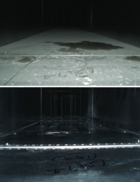Do your ventilation systems meet legal requirements?

Expelling harmful fumes and retaining a fresh flow of clean air is essential in maintaining a healthy and productive workplace. The Health & Safety Executive’s document HSG202 Guidance for Employers states that a minimum standard of fresh air is required to provide oxygen and remove carbon dioxide to produce a healthy working environment.
Insufficient fresh air may lead to tiredness, lethargy, headaches, dry or itchy skin and eye irritation for a building’s occupants. These common symptoms are known as ‘sick building syndrome’ (SBS), according to HSG202 Guidance for Employers.
It is vitally important to keep heating, ventilation and air-conditioning (HVAC) ductwork systems clean to avoid the accumulation of dust, dirt and other potentially harmful bacteria. If left, a build-up of these components can cause serious safety hazards in the workplace and, in the worst case, a fire outbreak.
Ventilation systems can also represent a fire hazard if fire dampers are not properly maintained. Fire dampers are installed in ventilation systems to prevent the spread of fire, and regular safety checks are essential to ensure they are in good working order.
Harmful deposits can accumulate in a number of areas within an air-supply system, including the air-handling unit, volume control dampers and turning vanes. In addition to the threat posed to staff and visitors, these deposits can impair the system’s performance, leading to uncomfortable humidity levels and expensive running costs.
Building managers must focus on the long-term benefits of maintaining clean ductwork.
• extend the working life of equipment
• vastly improve indoor air quality
• prevent the build up of airborne contaminants
Without regular inspections, businesses risk compromising the health of building occupants and facing civil litigation from injured parties due to failure to comply with regulations. There are a number of legal requirements.
The Workplace (Health, Safety and Welfare) Regulations 1992 (Regulation 5) stipulates that mechanical ventilation systems, including air-conditioning systems, are regularly cleaned, tested and maintained to ensure that they are kept clean and free from anything that may contaminate the air and cause health problems. Regulation 6 requires that an employer does what is needed to make sure that every enclosed workplace is ventilated by a sufficient quantity of fresh or purified air.
Building and facilities managers have a legal obligation to prevent the risk of fire within the buildings they manage under The Fire Safety Order (2005). Fire-safety obligations include conducting a ‘sufficient assessment of the risks to which relevant persons are exposed for the purpose of identifying the general fire precautions’ of the building.
As an employer, if you carry out industrial or non-industrial work processes, you are required to undertake a risk assessment under the COSHH Regulations (1999), which means assessing the risks to health of your employees who may be exposed to substances hazardous to health. You may then need to prevent or adequately control such exposure. Failure to meet the COSHH Regulations can result in a company becoming liable to enforcement action, including prosecution under the regulations of the Health & Safety at Work Act and civil claims, and lost productivity for the business.
The Health & Safety at Work Act 1974, section 2, requires that employers provide and maintain a working environment that is, so far is reasonably practicable, safe and without risk to health.
Comprehensive advice for professional ventilation hygiene providers on how ventilation systems should be cleaned and maintained is provided by the Heating & Ventilating Contractors’ Association’s (HVCA) Guide to Good Practice TR/19 Internal Cleanliness of Ventilation Systems. It includes guidelines to ensure that new ductwork systems remain protected during the installation period and prior to commissioning.
When commissioning maintenance work, building and facilities managers must employ highly trained, competent maintenance contractors who are able to give evidence of their skills and prove that they can carry out work to TR/19 standards.
System Hygienics has established a reputation for reliability and professionalism in air hygiene maintenance and offers a full range of specialist cleaning services, including ventilation ductwork cleaning, kitchen extract cleaning, marine industry cleaning, industrial and technical cleaning and infection control maintenance for healthcare establishments.
The company also provides an essential fire safety service whereby the location of the fire dampers in a ventilation system’s fire dampers will be established to ensure they are within the containment area for a fire and they will then be cleaned, lubricated, drop tested and reset to ensure they are in good working order and meet the requirements of The Fire Safety Order (2005).
In addition to its cleaning and fire safety services, System Hygienics conducts full risk assessment surveys in compliance with the Workplace, Health, Safety & Welfare Regulation Approved Code of Practice 1992. The surveys include a detailed report, with results of dust and microbiological samples, indoor air quality measurements, before-and-after photographs and recommendations on regular cleaning of a building’s ductwork to meet legal requirements.
Darren Ling is a director of System Hygienics
www.systemhygienics.co.uk








